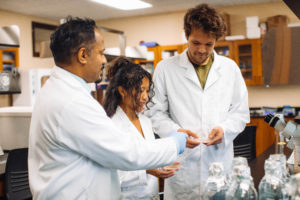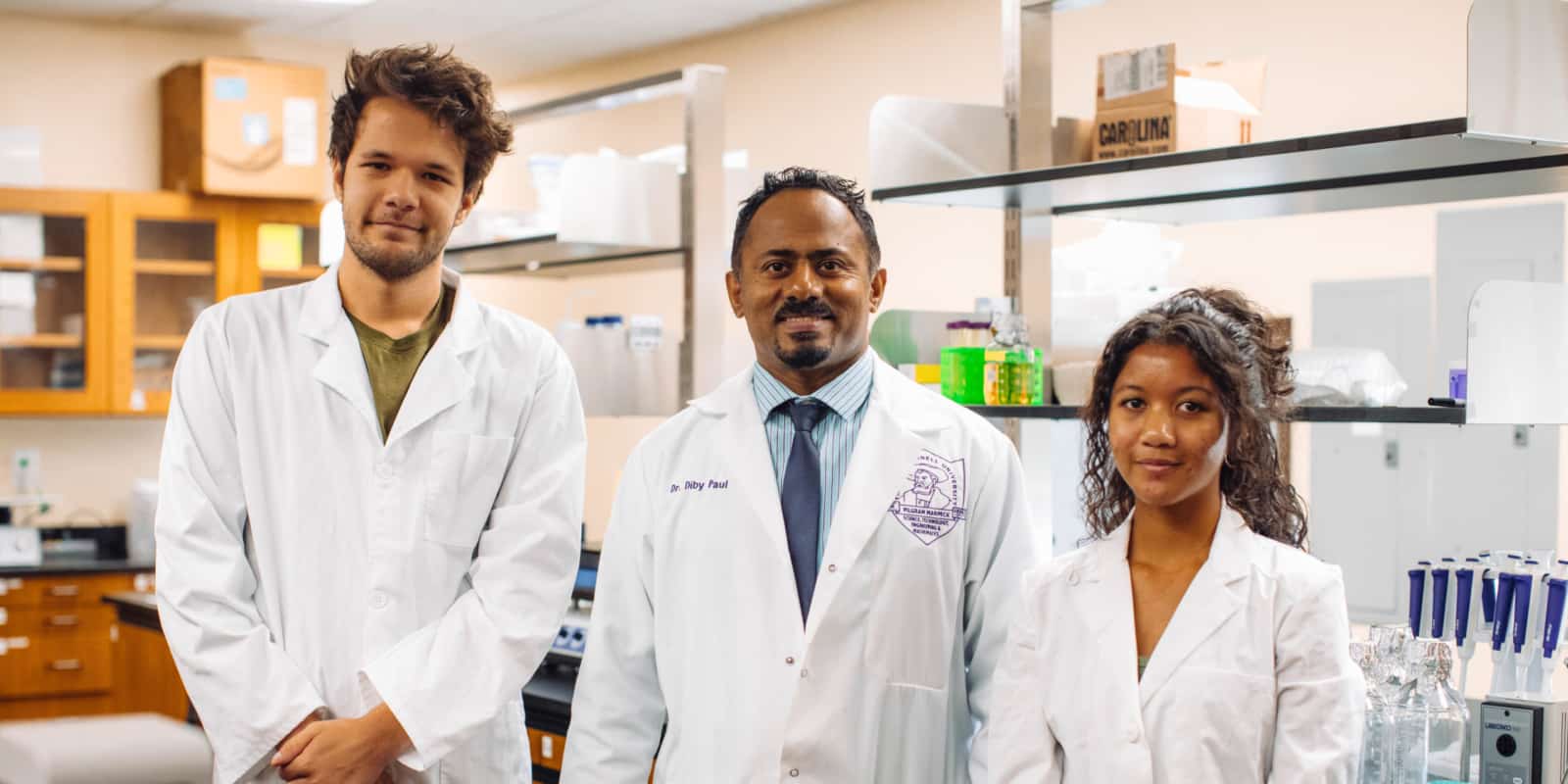The Pilgram Marpeck School of STEM at Truett McConnell University (TMU) offers every biology major opportunities for first-hand research experience, allowing them to take advantage of its laboratory facilities and the wealth of research experience of its professors. This year, juniors True Lookenott and Simone Chock are excited to work in TMU’s Sociomicrobiology & Microbial Interactions Laboratory (SMIL) under Dr. Diby Paul, professor of biology, researching an important topic in the microbiology world: quorum sensing and quorum quenching.

“Our goal is not only to research and prepare for our capstone,” Lookenott says, “but also to get a scientific article published with both our names on it.” Publishing will give them a competitive edge when applying for jobs, graduate school, or medical school. Both students also plan to present their research results at scientific conferences, where invaluable connections can be made.
“Another goal,” Chock adds, “is just getting to know our way around a research lab, using scientific equipment that most undergraduates might not ever see.” TMU’s biology research laboratory is well equipped with high-tech equipment available for student use.
Both students expressed their gratitude to TMU, the school of STEM, and to Dr. Paul for allowing them the opportunity to learn in a professional environment. Lookenott emphasizes, “The amount of time Dr. Paul and the other professors put into getting to know us, our interests, and our goals, and on top of that sacrificing more time to allow us to pursue those interests in the laboratory, shows just how much the faculty at TMU care about their students.”
Quorum quenching (QQ), the topic of their research, is important in reference to the controlling of human, animal, and plant pathogens. This new field in microbiology is also relevant to the prevention of hospital/healthcare-associated infections. Bacteria communicate to each other via chemical signals resulting in quorum sensing (QS). QS uses certain signal molecules called autoinducers that help bacteria to communicate with each other, allowing bacteria to form biofilms. While biofilms are vital to bacterial life on the planet, some biofilms cause problems for humans.
Lookenott explains, “Biofilms can grow on water-treatment membranes, which can cause damage to them. They can grow in catheters and other medical equipment. They even play a role in many infectious diseases. Thankfully, God has provided many different natural compounds that disrupt bacterial communication preventing biofilm formation.” This disruption between signals is quorum quenching at its simplest level.
These natural compounds, often found in medicinal plants, are a holistic way to disrupt these undesirable microbial communications, without the increased risk of antimicrobial resistance, a growing problem in healthcare. Dr. Paul has done extensive research in the past on these natural molecules, their QQ properties, and their application. With their research, Lookenott and Chock hope to isolate a new natural molecule and investigate its capabilities as a QQ compound. At TMU, students are taught to see God in all areas of their study.
“Being able to research in the lab and seeing God’s provision in the work that we do, encourages both True and I in our pursuit of knowledge about His creation through biology,” Chock says.
“People don’t realize that, even in a fallen world God’s provision is evident,” Lookenott says. “Not only did God place these QQ molecules in nature to control undesirable attributes of bacteria, but with His wisdom we can utilize His perfect creation to make cures for various human, animal, and plant diseases.”
Both students plan to take their knowledge and experiences into higher education following this research opportunity with TMU.
Faculty in the school of STEM encourage biology majors to become involved in research to gain hands-on experience in trending areas in biology. Dr. Paul, who has published several articles in peer reviewed scientific journals in the field of plant-microbial interactions and microbial communication, emphasizes his belief that all Christians should bring glory to God by gaining a deeper understanding of His creation.
God’s perfect and marvelous creation is yet another reason for believers to praise Him: “Many, Lord my God, are the wonders you have done, the things you planned for us. None can compare with you; were I to speak and tell of your deeds, they would be too many to declare” (Psalm 40:5).
Dr. Paul adds, “At TMU, the courses are designed in such a way that the students learn biology and other subjects through a biblical worldview, and learn to see God’s fingerprint in every area of life.”
###
Return to News Archive
